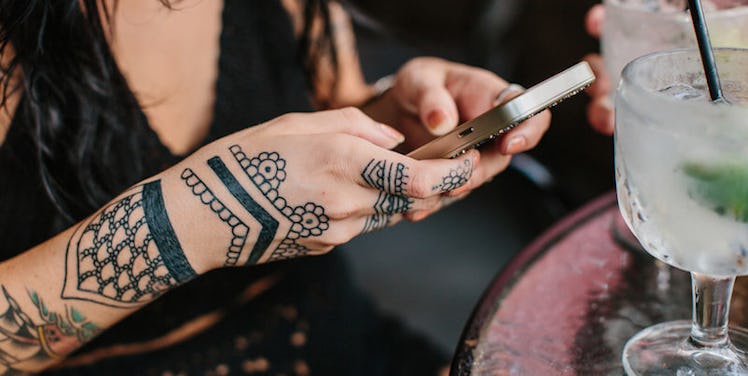
4 Things I Learned After Getting A Traditional Henna Tattoo As An American
Before you start reading this, I just want to quickly clear up one thing: I am not talking about the heart-shaped spray tattoos you'd usually get on a beach during spring break. I'm talking about the real thing, the traditional Indian form of body art that has been used for centuries as a cosmetic and spiritual tool.
Last week, I was at a spiritual event sponsored by the National Geographic Channel, and to deepen our experience with the Indian and Hindu culture, they hired henna tattoo artists. Knowing nothing about them at first, I was skeptical.
Would the ink irritate my skin? Can I shower? (Eventually, but naturally I didn't wait the full recommended time.) Is it supposed to get so crusty? (Yes, phew.) Here are four important things I learned about henna tattoos:
1. What actually is a henna?
It's a plant? Yeah, look it up. The ink is made from crushing the leaves of the henna plant, which is native to North Africa and South Asia. Before artists add oil, lemon juice, molasses or water to liquify the paste, the powder from the plant kind of looks like matcha. Henna can also be used to dye hair, nails and fabrics.
2. What is the purpose of henna as body art?
Henna tattoos have been used to adorn women's bodies as part of social and holiday celebrations for centuries. Whether it be saint days, birthdays, battle victories or weddings, henna tattoos were always a part of the equation. That is because they are symbols of luck, joy and beauty.
3. These artists are extremely passionate and talented.
Keep in mind, this wasn't done in a traditional tattoo shop. There were a few artists lined up at a table with a few bags of ink. That's it. They handled the ink as they would icing for a cupcake: in small piping bags, allowing them complete control of the weight and pressure of their hand. But, just because they weren't licensed "real" tattoo artists doesn't mean they weren't beyond impressive.
When it was my turn to be inked, instead of requesting a specific geometric design, I took a risk and told the artist to use her best judgment and give me whatever she thought would work. I definitely would have never done that if these tattoos were permanent (hennas only last about three weeks), but the result was so astounding I would even consider getting the design done permanently.
I knew I made the right decision in giving her the freedom to design as she saw fit. Her technique was absolutely impeccable, and the detail she put into these designs was astounding. She even asked me if she could take a picture of my hand when she was done. I was super proud of the design on my hand. Moral of the story? Don't belittle these artists.
4. People are more inclined to ask about it.
I've had more strangers talk to me over the past week than I've had in my entire life. Seriously. Living in New York City, people aren't exactly friendly. Fellow commuters don't normally approach a random woman on the subway and say, "Oh, I like your outfit," or "Hey, what book are you reading?" That's just not how people here are. They keep to themselves, and you find yourself keeping to yourself, too.
But this week, people weren't afraid to talk to me. I actually had one of those random women on the subway compliment it, a father with his son ask me about it and a cashier at Duane Reade stare at it the entire time she was ringing me up.
But, why? I have a real tattoo on my wrist, and I'm certain strangers see that one too and just choose not to ask about it. Maybe they consider asking about real tattoos too intrusive and personal? Or maybe, they ask due to the rarity of seeing a white woman with henna tattoos. I'm thinking the latter.
Personally, the only time I've seen a white woman with a henna tattoo was when fashion majors at my school were doing a bohemian modeling shoot. Seeing something out of the ordinary will inevitably prompt curiosity, and that's exactly what it did. It pushed people out of their comfort zone to find out more.
Yes, I will definitely get a henna again, and you should, too. Henna tattoos are not reserved for just one race or religion. In my experience, it actually brought people together rather than showcase how they're different.